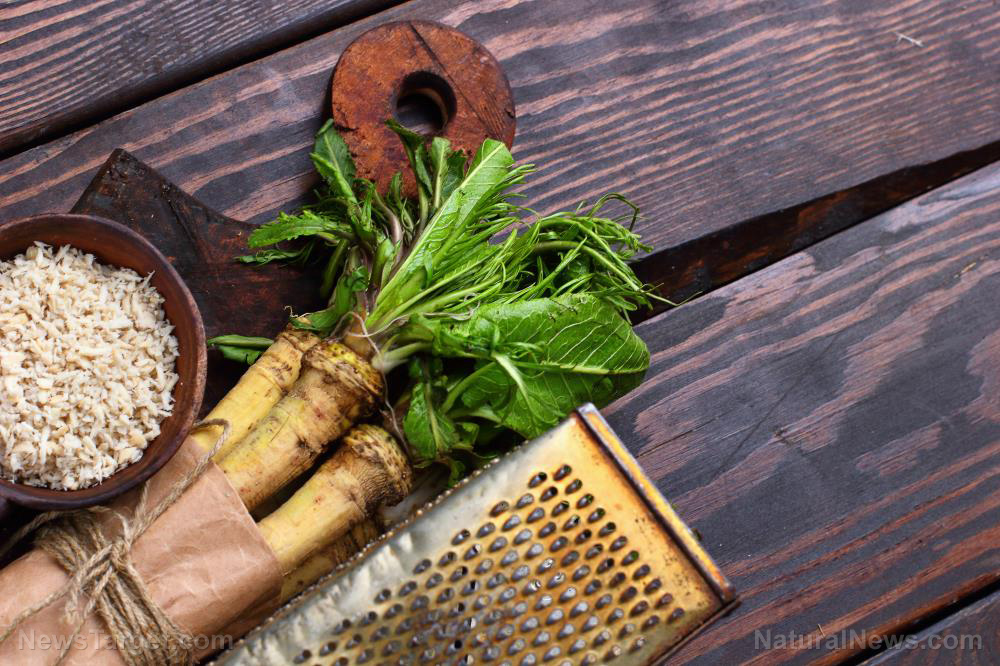
Advertisement
Horseradish is a popular spice consumed in Eastern Europe. It is a known cruciferous vegetable, alongside broccoli, cauliflower, cabbage and Brussels sprouts. Due to its distinct, pungent flavor, horseradish is typically used as a condiment or sauce for salads and sandwiches.
But horseradish provides nutritional and medicinal benefits as well. Here are some of them:
Contains essential nutrients, vitamins and minerals
The horseradish boasts an impressive nutrition profile. A 100 g serving of horseradish contains the following:
- Water: 85 g
- Calories: 48 kcal
- Protein: 1.18 g
- Fat: 0.69 g
- Carbohydrate: 11.29 g
- Fiber: 3.3 g
- Sugar: 7.99 g
- Calcium: 56 mg
- Iron: 0.42 mg
- Magnesium: 27 mg
- Phosphorus: 31 mg
- Potassium: 246 mg
- Zinc: 0.83 mg
- Manganese: 0.13 mg
- Vitamin C: 24.9 mg
Horseradish also contains traces of B complex vitamins, such as thiamin, riboflavin and niacin, that aid various body functions including metabolism, digestion and immunity.
Lowers the risk of cancer
Cruciferous vegetables are commonly associated with a reduced risk of cancer, especially that of the lungs and gastrointestinal tract. This anti-carcinogenic effect is primarily linked to the presence of glucosinolates in these vegetables. Glucosinolates are enzymes that are known to inhibit the growth of cancer cells as well as induce apoptosis or programmed cell death. Clinical studies also show that glucosinolates are readily absorbed by the body, which contributes to its efficacy as anti-carcinogens.
A recent study published in Journal of Agricultural and Food Chemistry revealed that horseradish contained up to 10 times more glucosinolates than its superfood cousin broccoli. Researchers of the study measured the potential anti-cancer and antioxidant activities from different grades of horseradish. The researchers found that the higher-grade horseradish contained more cancer-fighting glucosinolates. Therefore, the researchers concluded that the U.S. Fancy horseradish can be utilized as a dietary anti-carcinogen.
Boosts immunity
Horseradish contains high amounts of antioxidants that fortify the immune system and stimulate the production of white blood cells. Horseradish also contains the glucosinolate known as sinigrin, which is known to possess antioxidant, anti-fungal and antibiotic properties. As a powerful antioxidant, sinigrin can prevent cellular damage caused by disease-causing free radicals. It also promotes wound healing and relieves inflammation. Meanwhile, a compound known as isothiocyanate has potent antibiotic effects against bacteria including Escherichia coli and Staphylococcus.
Regulates blood pressure
Horseradish is an excellent source of potassium, an essential mineral known to regulate blood pressure and support overall cardiovascular health.
Reduces cholesterol
A 2005 animal study published in Nutrition Research showed that horseradish consumption lowered the cholesterol levels of mice fed a cholesterol-enriched diet. Researchers deduced that horseradish may inhibit the absorption of cholesterol in the gastrointestinal tract, thereby lowering the risk of hyperlipidemia, coronary heart disease and atherosclerosis.
Improves digestion
Horseradish contains high amounts of dietary fiber that aids digestion and regulates bowel movement. Fiber also prevents stomach aches, indigestion, constipation and diarrhea.
Eliminates toxins
As a diuretic, horseradish stimulates urination to rid the body of toxins including excess water and sodium. Therefore, regular consumption of horseradish can aid kidney functions and regulate the body’s detoxification process.
Aids weight loss
As a low-calorie food rich in dietary fiber, horseradish can promote feelings of satiety for longer periods. This effectively discourages the individual from overeating, binge eating or snacking in between meals.
Maintains bone health
Horseradish can boost bone development due to its considerable amount of calcium. It also greatly reduces the risk of fractures and osteoporosis.
Clears airways
The pungent odor of the horseradish can clear sinuses and eliminate excess mucus. Horseradish may be an especially potent remedy for congestion due to common cold, allergy or flu.
Supports fetal development
Horseradish is an excellent source of folate or folic acid, which is known to boost fetal bone and tissue development. A diet high in folic acid can also prevent birth defects and complications.
Horseradish contains bioactive compounds that have potent antioxidant, antibacterial and anti-carcinogenic properties. It may be consumed raw, pickled or cooked, but it is often used as a condiment or dressing.
Sources:
Advertisements







